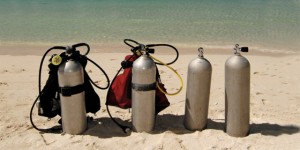For the majority of divers, going for a dive is not an everyday occurrence. Whether you’re a diver that only gets to go under once a year, or lucky enough to go every weekend, chances are that your passion for diving has led you to buy some of your own equipment. Whether it is just a set of fins and a mask or a top of the line kit, a set of dive gear is a big investment. And things like neglect, improper care, and poor cleaning can start to take a toll on your shiny new equipment. If you’re interested in doing everything you can to keep your equipment in top condition, check out our list of things to avoid:
For starters, don’t leave your equipment in direct sunlight. Yes, the sun will dry your gear fast, but the UV rays also break down rubber and fabric. While it may be hard to avoid putting your gear in direct sun on a blistering hot dive deck, many dive boats have shaded areas where you can store your gear; some will even let you pop your equipment under the seats. Also, diving involves a lot of energy and excitement. Don’t wear yourself out or get so distracted that you become unaware of where your gear is resting between dives; An expensive and shiny camera or state-of-the-art computer might not be where you left it if there are unscrupulous types walking by. Keep your equipment secure, tidy, out of the way.
If you’re going from the shore, you also need to understand: Sand. Is. Your. Enemy! Those tiny sand particles can get lodged in tank valves, regulators, and in the LP inflator or dumps on your BCD. Avoid placing your gear on sandy surfaces where possible, and always rinse it in fresh water after every dive. Try using a soft bristle toothbrush to remove sand from hard-to-reach crevices. Saltwater is another villain trying to destroy your beloved equipment. All metals and alloys have the potential for corrosion, especially when exposed to seawater. Preventing corrosion will extend the life of your gear and is much cheaper than repairing – or replacing – it. After every dive, no matter what, you should always wash your gear in fresh water.
Lastly, if you are not an avid diver, and only go once or twice a year, think about where you store your equipment. Scuba equipment has special storage requirements. For example, never pack away your gear until it is thoroughly dry, and coil your regulator hoses so they don’t kink. Store your items in damp-proof boxes, and avoid keeping it around areas with lots of dust and particles. If you take the time to store your gear properly, it will last longer.

